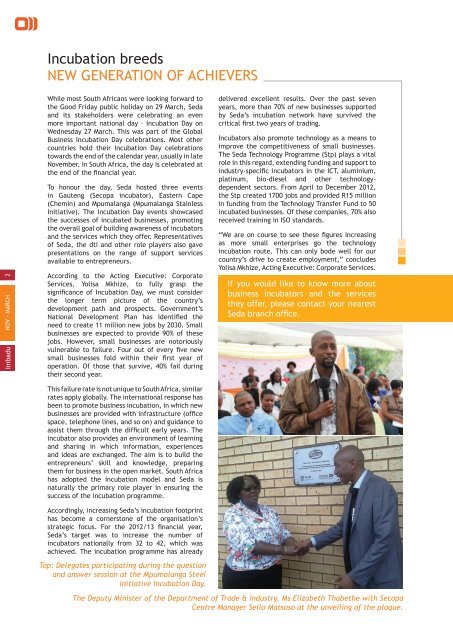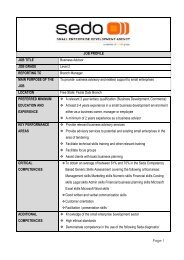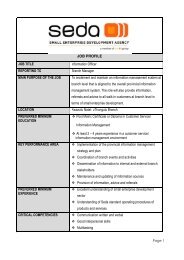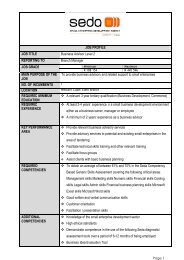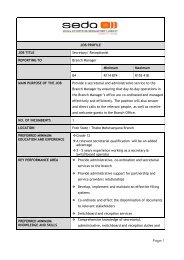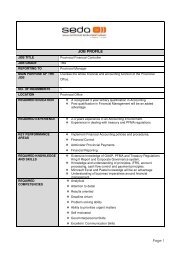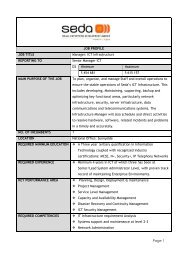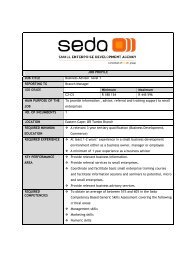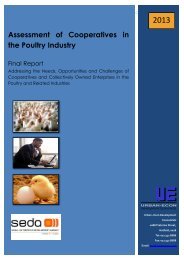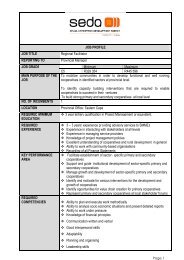Imbadu 10th Edition - Seda
Imbadu 10th Edition - Seda
Imbadu 10th Edition - Seda
Create successful ePaper yourself
Turn your PDF publications into a flip-book with our unique Google optimized e-Paper software.
2<br />
Incubation breeds<br />
new generation of achievers<br />
<strong>Imbadu</strong> Nov - March<br />
While most South Africans were looking forward to<br />
the Good Friday public holiday on 29 March, <strong>Seda</strong><br />
and its stakeholders were celebrating an even<br />
more important national day – Incubation Day on<br />
Wednesday 27 March. This was part of the Global<br />
Business Incubation Day celebrations. Most other<br />
countries hold their Incubation Day celebrations<br />
towards the end of the calendar year, usually in late<br />
November. In South Africa, the day is celebrated at<br />
the end of the financial year.<br />
To honour the day, <strong>Seda</strong> hosted three events<br />
in Gauteng (Secopa incubator), Eastern Cape<br />
(Chemin) and Mpumalanga (Mpumalanga Stainless<br />
Initiative). The Incubation Day events showcased<br />
the successes of incubated businesses, promoting<br />
the overall goal of building awareness of incubators<br />
and the services which they offer. Representatives<br />
of <strong>Seda</strong>, the dti and other role players also gave<br />
presentations on the range of support services<br />
available to entrepreneurs.<br />
According to the Acting Executive: Corporate<br />
Services, Yolisa Mkhize, to fully grasp the<br />
significance of Incubation Day, we must consider<br />
the longer term picture of the country’s<br />
development path and prospects. Government’s<br />
National Development Plan has identified the<br />
need to create 11 million new jobs by 2030. Small<br />
businesses are expected to provide 90% of these<br />
jobs. However, small businesses are notoriously<br />
vulnerable to failure. Four out of every five new<br />
small businesses fold within their first year of<br />
operation. Of those that survive, 40% fail during<br />
their second year.<br />
delivered excellent results. Over the past seven<br />
years, more than 70% of new businesses supported<br />
by <strong>Seda</strong>’s incubation network have survived the<br />
critical first two years of trading.<br />
Incubators also promote technology as a means to<br />
improve the competitiveness of small businesses.<br />
The <strong>Seda</strong> Technology Programme (Stp) plays a vital<br />
role in this regard, extending funding and support to<br />
industry-specific incubators in the ICT, aluminium,<br />
platinum, bio-diesel and other technologydependent<br />
sectors. From April to December 2012,<br />
the Stp created 1700 jobs and provided R15 million<br />
in funding from the Technology Transfer Fund to 50<br />
incubated businesses. Of these companies, 70% also<br />
received training in ISO standards.<br />
“We are on course to see these figures increasing<br />
as more small enterprises go the technology<br />
incubation route. This can only bode well for our<br />
country’s drive to create employment,” concludes<br />
Yolisa Mkhize, Acting Executive: Corporate Services.<br />
If you would like to know more about<br />
business incubators and the services<br />
they offer, please contact your nearest<br />
<strong>Seda</strong> branch office.<br />
This failure rate is not unique to South Africa, similar<br />
rates apply globally. The international response has<br />
been to promote business incubation, in which new<br />
businesses are provided with infrastructure (office<br />
space, telephone lines, and so on) and guidance to<br />
assist them through the difficult early years. The<br />
incubator also provides an environment of learning<br />
and sharing in which information, experiences<br />
and ideas are exchanged. The aim is to build the<br />
entrepreneurs’ skill and knowledge, preparing<br />
them for business in the open market. South Africa<br />
has adopted the incubation model and <strong>Seda</strong> is<br />
naturally the primary role player in ensuring the<br />
success of the incubation programme.<br />
Accordingly, increasing <strong>Seda</strong>’s incubation footprint<br />
has become a cornerstone of the organisation’s<br />
strategic focus. For the 2012/13 financial year,<br />
<strong>Seda</strong>’s target was to increase the number of<br />
incubators nationally from 32 to 42, which was<br />
achieved. The incubation programme has already<br />
Top: Delegates participating during the question<br />
and answer session at the Mpumalanga Steel<br />
Initiative Incubation Day.<br />
The Deputy Minister of the Department of Trade & Industry, Ms Elizabeth Thabethe with Secopa<br />
Centre Manager Sello Matsoso at the unveiling of the plaque.


